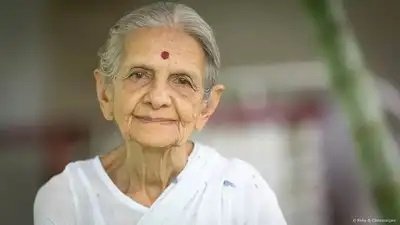
On the morning of April 1, 2025, in the quiet town of Navsari, Gujarat, a chapter in history came to a peaceful close. Nilamben Parikh, the great-granddaughter of Mahatma Gandhi, passed away in her home at the age of 92. A woman of quiet strength and unwavering principles, she was not only a descendant of the Mahatma but also a force in her own right—a social reformer, a writer, and a guardian of the Gandhian way of life.
Her son, Dr. Sameer Parikh, an ophthalmologist in Navsari, recalled his mother’s final moments with poignant simplicity.
“My mother was not sick, but in the last few days, she had stopped eating much because of her age. She had severe osteoporosis and was slowly becoming weaker. This morning, I decided to stay with her instead of going to my hospital. I sat beside her, held her hand, and slowly felt her pulse fade… she passed away without pain or suffering.”
It was a farewell as serene as the life she had led—one devoted to service, truth, and the quiet revolution of empowerment.
A Life Steeped in Service
To many, Nilamben Parikh was more than just a great-granddaughter of Mahatma Gandhi. She was a custodian of his ideals, a woman who chose to dedicate her life to those often overlooked by society.
For decades, she worked tirelessly to uplift tribal women through Dakshinapatha, an organization she founded. Education, financial independence, and self-reliance were the pillars of her mission. She believed that true empowerment came not through charity but through opportunity—a philosophy deeply rooted in her grandfather’s vision.
Though she retired nearly three decades ago, her impact remained indelible. Even in her later years, when frailty set in, she continued to embody the principles of simplicity and perseverance.
Her cousin, historian Tushar Gandhi, remembered her as a woman of profound moral strength.
“She spent her entire life teaching in tribal areas. Even though she was physically weak, her moral strength shined through her personality. She was gentle yet firm in her beliefs, always kind,” he told The Indian Express. The age gap between them was significant, he recalled, and as a result, he always saw her more as an elder than a cousin.
Nilamben’s commitment to wearing khadi was more than symbolic—it was a quiet but powerful statement. It was a pledge to sustainability, to self-sufficiency, and to the Gandhian philosophy that had shaped her very existence.
A Chronicler of Forgotten Stories
Beyond her work as a social reformer, Nilamben Parikh was also a writer, unafraid to explore the complexities of her own lineage.
She was the daughter of Ramiben, the eldest of Harilal and Gulab Gandhi’s five children. Her grandfather, Harilal Gandhi, remains one of the most enigmatic figures in the Mahatma’s story—a son who struggled in the shadow of his father’s greatness, a man torn between rebellion and reverence.
After watching the Marathi play Gandhi Virudh Gandhi, which delved into this turbulent father-son relationship, Nilamben felt a deep sense of responsibility. She knew the story had more to it—more heartache, more nuance, and more truth than what had been portrayed.
And so, she set out to tell it.
Her book, Gandhi’s Lost Jewel: Harilal Gandhi, was her way of bringing balance to history. It offered an insider’s perspective on a man who had long been reduced to footnotes in the grand narrative of India’s independence. The book later inspired the 2007 Hindi film Gandhi My Father, bringing Harilal’s story to a wider audience.
Her writings extended beyond familial struggles. She also compiled a book titled Jyan Raho Tyan Mehekta Raho (translated as Spread Your Fragrance Wherever You Live), which was based on Mahatma Gandhi’s letters to his daughters-in-law. The title was derived from a message the Mahatma had once given them—an instruction not just for them, but for all who sought to live meaningful lives.
A Legacy Beyond Bloodlines
Nilamben Parikh’s passing is more than the loss of a historical descendant; it is the closing of a living link to an era of resilience, sacrifice, and unwavering moral conviction.
Her legacy is not just in books or in the lives she touched but in the quiet revolution she carried forward—a belief that change begins in the smallest of places, in the simplest of actions, in the steadfast refusal to turn away from those in need.
History will remember Mahatma Gandhi as a leader.
But history should also remember Nilamben Parikh as a torchbearer of his ideals.
Her work was not as loud, her name not as well-known.
And yet, in the quiet hills of tribal Gujarat, in the hands of women she empowered, and in the pages she left behind—her legacy will continue to whisper through time.

